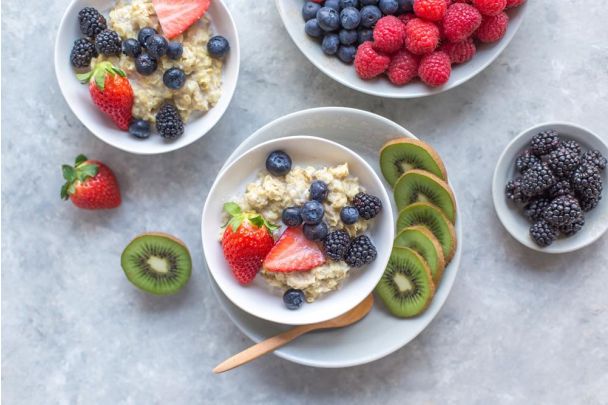In this article
- WHAT DOES A HEALTHY DIET LOOK LIKE?
- THE LINK BETWEEN PROBIOTICS AND A HEALTHY WEIGHT
- EATING MORE PREBIOTIC FOODS ALSO HELPS WITH WEIGHT MANAGEMENT
- WHAT OTHER FACTORS CONTRIBUTE TO A HEALTHY WEIGHT?
- I EAT A LOT OF YOGURT. DO I REALLY NEED TO TAKE A PROBIOTIC SUPPLEMENT?
- HAVE YOU TRIED RENEW LIFE DAILY BALANCE PROBIOTICS + PREBIOTICS?
- HEALTHY WEIGHT MANAGEMENT IS A LIFESTYLE, NOT A SHORT-TERM FIX
Overweight and obesity are now considered serious health problems in the United States. According to the Centers for Disease Control and Prevention (CDC), more than 70 percent of adults age 20 and older are overweight or obese. Why is this concerning? Because excess body weight can increase the risk of type 2 diabetes, high blood pressure, heart disease and a host of other health conditions that can impact overall wellness and longevity.
Not surprisingly, the trend is quickly being passed along to our children and teens.
Children as young as two years of age are showing signs of obesity, setting them up for a lifetime of potential health problems if the issue is not addressed. The American Heart Association (AHA) has revealed the majority of kids are not meeting AHA standards for optimal cardiovascular health, primarily due to an unhealthy diet. In fact, 91 percent of U.S. children have a poor diet, say AHA experts.
WHAT DOES A HEALTHY DIET LOOK LIKE?
A healthy diet is essential for optimal health. Eating the right foods in the right portions can go a long way toward not only keeping your waistline trim, but also protecting your body from illness and disease.
While fad diets will come and go, the majority of health experts agree that the body benefits most from a combination of low-sugar fruit, non-starchy vegetables, whole grains, nuts and legumes, protein sources such as fish and poultry, and good-for-you fats such as olive and sunflower oils. Limiting or avoiding sugar, excess sodium and unhealthy fats is also important.
You may have heard this type of diet referred to as the Mediterranean diet because of its prevalence in Mediterranean countries including Greece, Italy and Spain. Over the last several decades, scientists have come to associate this way of eating with a healthy mind and body, and leading U.S. universities have attributed a Mediterranean-style diet with weight management, heart health, stronger bones, improved mood, reduced cognitive decline and protection against some types of cancer.
THE LINK BETWEEN PROBIOTICS AND A HEALTHY WEIGHT
Probiotics are the beneficial microbes found in and around the human body (primarily in the gut) that support optimal digestive function and overall wellness in a variety of ways. More recently, scientists have been looking into the connection between gut microbes and successful weight management, and several studies point to the benefits of probiotics for weight loss.
After analyzing the findings from over two dozen clinical trials involving nearly 2,000 healthy adults, researchers in China reported that taking a daily probiotic supplement was linked to weight loss as well as a reduction in body mass index (BMI). Not only that, but participants lost even more weight when they consumed multiple typesof probiotic bacteria, and on a regular basis.
Similarly, clinical trials involving the probiotic Lactobacillus gasseri BNR17™ revealed that overweight and obese adults who received the probiotic experienced a reduction in waist and hip circumference as well as a decline in overall body fat.
Another study involving more than 40 patients who had recently undergone gastric bypass surgery also points to the benefits of probiotics for healthy weight management. Researchers discovered that patients who received a daily dose of Lactobacillus bacteria “attained significantly greater percent excess weight loss” when compared with those in the control group.
Finally, this investigation into the relationship between weight loss and gut bacteria in a group of overweight teens confirmed what scientists have been saying for decades: that your gut microbial composition and your weight may influence each other.
EATING MORE PREBIOTIC FOODS ALSO HELPS WITH WEIGHT MANAGEMENT
Researchers in Spain followed more than 8,500 adults for nearly a decade before determining that those who ate the most prebiotic foods were less likely to put on excess pounds over time—even when taking into account other diet and lifestyle factors.
Findings from the study, published in the American Journal of Clinical Nutrition, point to the fact that prebiotic-rich foods provide nourishment for our beneficial gut microbes. This triggers the production of short-chain fatty acids (SCFAs), which in turn release hormones that help control appetite. In previous studies, SCFAs have also been shown to help burn more calories.
What are prebiotics again?
Prebiotics are non-digestible (or partially digestible) food ingredients known to support the growth of good bacteria in the gut, where at least 70% of the immune system can be found. Prebiotics are found naturally in many foods with a high fiber content, including asparagus, leeks, onions, garlic, Jerusalem artichoke, Brussels sprouts, bananas and—more recently—almonds.
WHAT OTHER FACTORS CONTRIBUTE TO A HEALTHY WEIGHT?
While diet and nutrition play a critical role in weight gain and loss, many other factors can influence whether or not you are able to maintain a healthy weight. These include family history and genetics, environmental factors, metabolic function (how effectively your body turns food into energy), the presence of stress and anxiety, learned eating habits, how active you are, and how well (and how much) you sleep.
Making sure you drink plenty of water is also important. A University of Illinois study found that individuals who increased their daily water consumption by just 1% were likely to consume fewer calories and less saturated fat, sugar, sodium and cholesterol.
Finally, taking in less energy (i.e., fewer calories from food and beverages) than you burn each day is an effective way to shed excess pounds and reach your ideal weight goal.
I EAT A LOT OF YOGURT. DO I REALLY NEED TO TAKE A PROBIOTIC SUPPLEMENT?
While it’s true that live bacteria can be found naturally in some non-pasteurized, fermented foods such as yogurt, kefir, sauerkraut and miso, most people get very few of these foods in their daily diet. And even if you do, you would have to eat a lot of yogurt—about a gallon a day to get the same amount of live bacteria as a Renew Life probiotic.
Still, protein-rich plain Greek yogurt may be a great addition to a well-rounded nutritional plan if you are trying to control your appetite and maintain a healthy body weight. In addition to having more live bacteria than regular yogurt, it typically contains less sugar and double the healthy protein.

HAVE YOU TRIED RENEW LIFE DAILY BALANCE PROBIOTICS + PREBIOTICS?
Unlock the power of potent probiotics and clinically studied Xylooligosaccharides (XOS) prebiotics with Renew Life® Daily Balance 2-in-1 Prebiotics + Probiotics. Plant-based XOS is a prebiotic that feeds our carefully selected probiotic strains and can also nourish some of your own good gut bacteria.*
- Everyday digestive and immune support*
- Helps maintain digestive health and regularity*
- Supports immune and respiratory health*
- Clinically shown to be gentle and well-tolerated in your gut*
- Quality, purity and potency guaranteed through expiration
- Made in the USA using only the highest quality global ingredients
HEALTHY WEIGHT MANAGEMENT IS A LIFESTYLE, NOT A SHORT-TERM FIX
Too often people get caught up in the latest diet trend and forget that maintaining your ideal weight is actually a long-term commitment to making healthier choices every day. Focusing on good nutrition, exercising more often, taking a daily probiotic supplement, and minimizing stress are just a few of the ways you can support a balanced gut and a healthy body, which in turn will help you achieve your healthy weight goal.











Share: